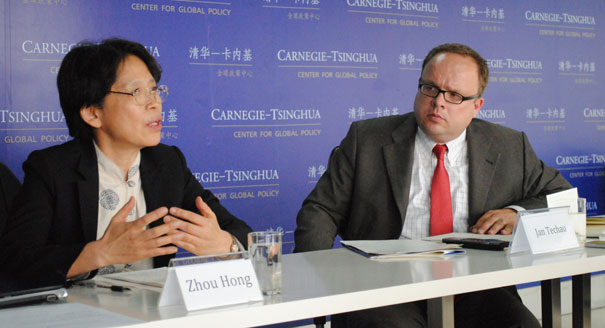Registration
You will receive an email confirming your registration.
The Carnegie-Tsinghua Center for Global Policy hosted a video conference between Chinese, NATO, and EU experts in Beijing and the NATO headquarters in Brussels. The event was the fourth installment of a Carnegie-Tsinghua series on strategic engagement with NATO, and was moderated by Carnegie Europe’s Jan Techau.
NATO and the New Strategic Concept
NATO has established relationships widely throughout the northern hemisphere. Discussants explained that NATO’s new Strategic Concept has three main goals: collective defense, crisis management, and partnership and engagement.
- NATO and NATO’s Partnerships: Currently, NATO’s 28 member states have bilateral agreements with several contact countries and eight “global partners” (Japan, Korea, Australia, New Zealand, Mongolia, Afghanistan, Pakistan, and Iraq) with whom it seeks to enter deeper security cooperation. A NATO official stressed that NATO’s operational engagement with outside partners differs from one country to another.
- Collective Defense: Collective defense remains the primary purpose for NATO’s existence, participants said. This requires dynamic engagement among the 28 member states and also requires all member states to operate under the premise of consensus.
- Crisis Management: Following the Balkans crisis and the dissolution of the former Yugoslavia, the necessity for crisis management became a significant tool for NATO, participants added. Close ties with the UN soon developed as the two served to work as crisis management agents.
- Partnership and Engagement: A NATO official reemphasized the words of NATO’s Secretary-General, Anders Fogh Rasmussen, who believed in changing the understanding of security from being a zero-sum game to a cooperative endeavor. The official added that NATO seeks to partner and engage with nations globally, including China, to develop commonalities on threat perception and tools that might be applied to deal with threats.
NATO-China Relations
China remains the only permanent member of the UN Security Council that does not have formalized, institutionalized relations with NATO.
- Current Engagement: A NATO official described how the NATO-China relationship, formed in 2002, has seen continued improvement in dialogue and exchange. One example was the successful cooperation on joint China-NATO counter-piracy efforts in the Indian Ocean. The official suggested that these efforts could serve as a roadmap for future practical and political cooperation. Another NATO official suggested that NATO and China could cooperate on Afghanistan as a doorway for improved NATO-China cooperation.
- NATO’s Asia-Pacific Policies: A NATO official emphasized that NATO is and will not be an Asia player. That is why NATO does not have a position on the territorial disputes in the East China Sea. The one exception was NATO’s statement on North Korea and its ballistic missiles tests, because of the global relevance and security implications surrounding the issue. Several NATO officials repeatedly stressed that their partnerships are not directed against China or any other power. However, Li Haidong, a professor at China Foreign Affairs University, warned that many Chinese analysts view the United States as building an international security system that places China at the margins. Given the importance and strength of the U.S.-NATO relationship, such a strategic move could jeopardize China-NATO relations. A NATO official replied that the dealings of NATO are based on consensus and does not automatically mimic the U.S. security agenda.
- Barriers to NATO-China Cooperation: Several Chinese discussants reflected on the barriers to stronger cooperation between NATO and China. Zhou Hong, director of the Institute of European Studies at the Chinese Academy of Social Sciences, explained that NATO’s interventions in other countries seem to ignore local realities and opinion. Li added that NATO’s role in promoting political transformation within other countries seems almost the virtual opposite of China’s foreign policy aims. He stated that NATO’s modern-day public image within China is still represented by the 1999 NATO bombing of the Chinese embassy in Yugoslavia. Jane Huang, a researcher at the China Institutes of Contemporary International Relations, noted that NATO has ties to all the most difficult problems that the Chinese government faces internationally. She added that until China has a clear idea of what kind of global order it wants, its relations with NATO cannot mature swiftly.
NATO-Russia Relations
NATO has established relations with Russia through the NATO-Russia Council. Their main objective is nuclear transparency, discussants explained.
- Transparency and Cooperation: A NATO official echoed that increasing transparency over strategic and tactical nuclear weapons is an important objective of the NATO-Russia Council. Along with deeper cooperation on nuclear weapons, NATO has worked hard to assure Russia that its missile defense systems are not a target. Another NATO official highlighted the successful cooperation between NATO and Russia on stabilizing Afghanistan.
- Moving Nuclear Weapons: Carnegie’s Li Bin asked about NATO’s proposal for the movement of Russian nuclear weapons from Europe to Siberia. A NATO official responded NATO does not want to see a movement of nuclear weapons in Russia, as such movement might be seen as provocative and would produce concerns about the security of the weapons systems. He confirmed that NATO wants Russia to reduce the number of its nuclear weapons.
Discussants included: Li Haidong, Zhou Hong, Jane Huang, Ted Whiteside, Capt. Denis Heimferte, Gabriele Cascone, Gilles Vander Ghinst, Zsolt Rabai, Daniel Krahl
